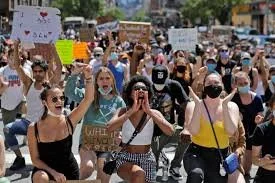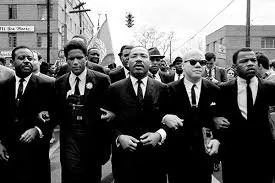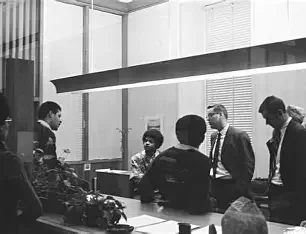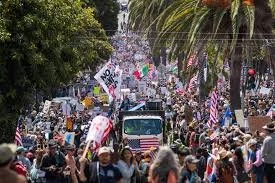Stand up for what is right
If you see something that you know is a problem, or something that goes directly against what you know is right, act. Spread your voice - you have a right to be heard.
“Important principles may, and must, be inflexible” ~ Abraham Lincoln
The more people, the better
-
In the Million Student March, thousands of students coordinated a protest to alleviate the struggle of college debt and other financial issues for young people. This major protest in 2015 was organized across many campuses. Because of the widespread participation, the protest was known across the nation and high-level politicians were led to discuss policy changes.
-
In 2025, students from a few different colleges in California protested the immigration enforcement policies being used to deport immigrants. They didn’t just call for national change — they also called for universities to step up and formally protect immigrant students.
In such a heated time and with such a heated topic, these students decided to advocate for what they believed in against a fiercely opposing federal government.
If one person can make a difference with their voice, the collective voice of many is one that cannot be denied. Alone, it might be a bit harder to make others care about the problem you can see. With the organization of more people, any powerful authority will be able to better understand how widespread the effect of the problem is.
If you know that you’re advocating for the right cause, making others care is the only way to spread that truth.
Ask around, put your message out there - it is likely that there are others thinking the same thing as you.
Communicate and organize - protests don’t happen by themselves, but with the support of a group.
“In unity there is strength” ~ Aesop
Protest Peacefully
The movements of Gandhi and King saw incredibly violent oppression. As instructed, the protestors in each movement fought back, not with their fists but with sensible, civil, unwavering composure. Peaceful protesting kept these movements away from disorganized chaos, and with this organized strength in values, the movements succeeded.
While you might think more violent approaches are the only way to properly show your desire for change, protesting in peaceful ways (such as marches, speeches, or demonstrations) shows that you care just as much as any more violent form of protesting does. This form of protesting is also seen as coming from a place of reason and therefore will settle better with lawmakers and authorities.
Be peaceful - use words, demonstrations, and the collective passion of many to persuade.
Be deliberate - with the group that you’re going to protest with, plan out exactly how you will act, and make sure everyone is equally informed. Everyone needs to know that their passion for change should be channeled into civil behavior.
“Darkness cannot drive out darkness; only light can do that. Hate cannot drive out hate; only love can do that” ~ Martin Luther King Jr.
-
At Swarthmore college (1969), students organized a sit-in in the administration’s office to achieve more equal representation in multiple regards (admissions, recognition, etc.). The protestors were serious and deeply concerned about this issue; their passion for the issue helped to spark significant changes within the college.
Learn More:
https://www.swarthmore.edu/a-brief-history/1969-black-student-protest-movement
-
The Silent Vigil (1968) was held at Duke University after the assasination of Martin Luther King Jr. to honor his legacy and create further changes towards racial equality. In memoriam of MLK’s famed method of protesting, peaceful protesting, the over 2000 participants protested by standing and marching peacefully.
Learn More:
The Protest Must Matter
A protest should be rooted in passion. If a group of people has a slight desire for something to change, that’s not an effective protest. The movement will fall before there is actual change. Instead, the best protests are created by a group of people who deeply understand that there is a need for change. If the problem isn’t evoking enough passion for a protest, consider why that is.
Have a purpose - Don’t be afraid to stand up for what is right, but make sure you’re protesting matters that are meaningfully affecting lives and that you care deeply about.
Regulate that purpose - If you have a group, make sure the group is all on the same page of what the purpose of protesting is. Be there to maintain group morale and passion for change.







